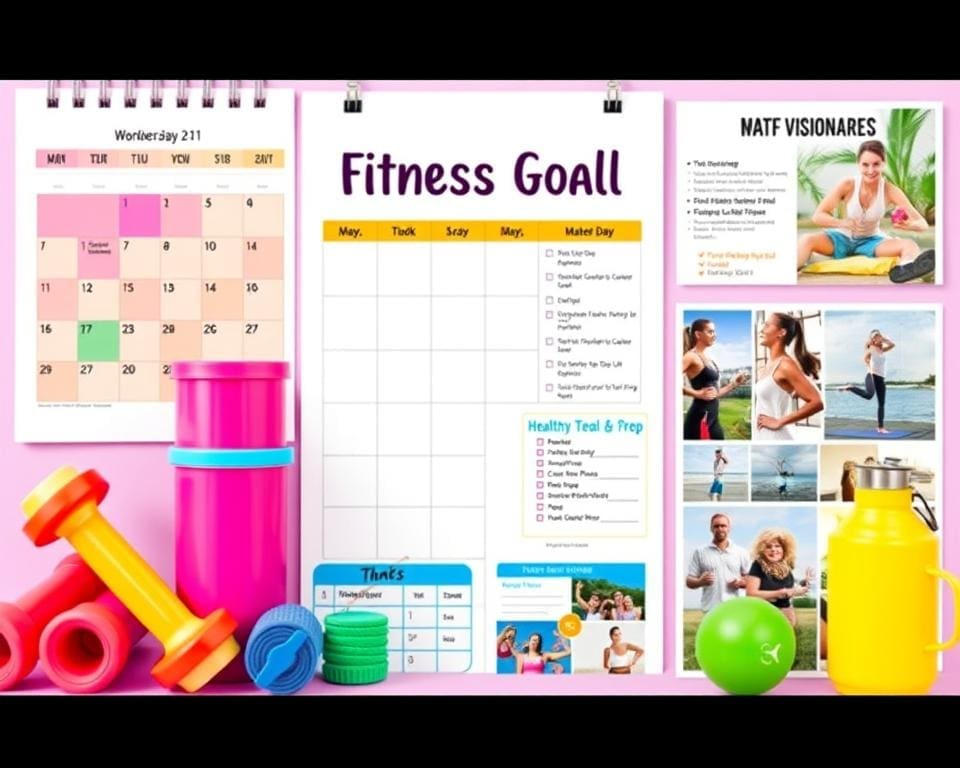Embarking on your fitness journey begins with the crucial step of creating a workout routine you’ll stick to. It’s essential not just to establish a regimen, but to harmonise it with your personal goals and lifestyle. According to the National Health Service (NHS), regular physical activity is fundamental for sustaining health, mitigating the risk of chronic diseases, and enhancing mental well-being. By tailoring your routine to fit your individual needs and preferences, you set the stage for a sustainable success story, paving the way for long-term fitness transformation.
Understanding Your Fitness Goals
Recognising fitness objectives plays a crucial role in one’s journey towards a healthier lifestyle. Personal fitness objectives can vary significantly, extending from weight loss and muscle gain to enhanced endurance or flexibility. It is essential to pinpoint these goals to tailor a personal fitness programme that caters to individual needs.
Identifying Personal Fitness Objectives
Start by reflecting on what you wish to achieve with your fitness routine. Listing your desired outcomes allows for clarity. Common objectives might include:
- Improving cardiovascular health
- Increasing strength and muscle mass
- Enhancing overall well-being
- Boosting energy levels
Setting Realistic Targets for Your Exercise Plan
Implement a methodical approach to setting targets. Utilising the SMART criteria can help ensure that your fitness goals plan includes:
- Specific: Define precise goals, such as “lose 5kg” instead of “get fit”.
- Measurable: Determine how you will track progress.
- Achievable: Make sure your targets are within reach based on current fitness levels.
- Relevant: Align your objectives with your lifestyle and interests.
- Time-bound: Set deadlines to maintain motivation.
By setting realistic targets, you create a manageable path towards achieving your fitness aspirations, which ultimately fosters commitment to an effective gym routine.

Creating a Workout Routine You’ll Stick To
Crafting a workout plan requires careful consideration to ensure it resonates with your personal fitness aspirations. The emphasis should be placed on designing a sustainable workout routine that not only aligns with your goals but also promotes enjoyment and engagement. Building a consistent training schedule can serve as the backbone of an effective strategy, facilitating progress over time.
Designing a Sustainable Workout Routine
A sustainable workout routine incorporates components of cardiovascular, strength, and flexibility training, tailored to individual needs. It is vital to identify activities that you genuinely enjoy, as this intrinsic motivation fosters adherence. For instance, including a mix of running, resistance exercises, and yoga could yield a well-rounded approach that enhances physical fitness while being enjoyable.
Incorporating Variety into Your Fitness Regimen
Introducing variety into your fitness regimen is essential for maintaining interest and avoiding burnout. A long-term exercise routine should consist of diverse workout formats, such as interval training, dance classes, or circuit workouts. Not only does this prevent monotony, but it can also mitigate the risk of injuries associated with repetitiveness. Adapting your routine keeps you engaged and committed, contributing to a sustainable workout journey.
Staying Motivated and Committed
Maintaining motivation can be one of the toughest aspects of sticking to a workout routine. Crafting a personal fitness programme that resonates with your interests is crucial for fostering ongoing motivation. One effective strategy is to incorporate short-term challenges, which can provide a fresh perspective on your fitness journey and keep your enthusiasm alive.
Utilising apps like MyFitnessPal can significantly aid in tracking your progress, offering insights into your efforts and celebrating small victories along the way. This tracking not only helps in maintaining motivation but also cultivates a sense of achievement that contributes to sustained exercise engagement. Additionally, establishing social support systems can enhance accountability; whether it’s through a workout buddy or a fitness group, sharing your goals can make a substantial difference.
Rewarding yourself for reaching specific milestones can also serve as an excellent motivational tool. Research highlighted in the Journal of Health Psychology emphasises the psychological advantages of perceived progress and social support. These elements not only boost commitment to your routine but also reinforce the enjoyment of your fitness programme, encouraging you to push forward with new vigour.








